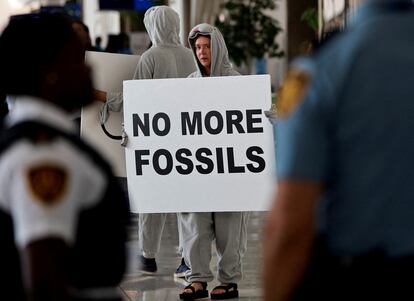UN climate summit reaches deal to ‘transition’ away from fossil fuels
The text agreed to by the 200 countries gathered in Dubai for COP28 makes a direct mention for the first time of the main culprits of the climate crisis: oil, coal and gas

After a long night of negotiations in Dubai, representatives of the nearly 200 countries gathered at the United Nations COP28 climate summit in the United Arab Emirates (UAE) approved a deal on Wednesday morning that calls for “transitioning away from fossil fuels in energy systems in a just, orderly and equitable manner, accelerating action in this critical decade.” The direct reference to oil, gas and coal, the main culprits of the climate crisis, represents a change: during decades of earlier talks, calls to abandon fossil fuels had been left out of the final texts of climate agreements.
The summit presidency was led by the United Arab Emirates, a country that derives around 30% of its revenue from oil and gas, something that had led many to doubt that a direct call against fossil fuels would come out of the gathering. But it did, despite strong, open opposition from highly oil-dependent countries such as Saudi Arabia and Iraq.
“Many said we couldn’t,” said COP28 president Sultan al-Jaber, who led the negotiations and described the outcome as “a historic package to accelerate climate action.” Paradoxically, Al-Jaber, in addition to being UAE’s Minister of Industry, is the CEO of ADNOC, the state-owned oil company.
With its focus on fossil fuels, the summit had become an all-or-nothing affair. Either the final text would mention fossil fuels for the first time in the final deal (this had already been unsuccessfully attempted at the Glasgow summit in 2021) or not at all, which would represent a failure for many participants, including the European Union, which stands out for its activism on this point.
The main question as talks entered the final stretch was what action word would accompany the reference to fossil fuels. The most ambitious nations wanted a clear “phase-out” as opposed to the “reduction” that appeared in the draft released by the COP28 presidency on Monday, and which aroused significant criticism from environmentalists.
Finally, the last draft agreed to in the early hours of Wednesday, past the summit’s official ending date, proposed “transitioning away from fossil fuels in energy systems, in a just, orderly and equitable manner, accelerating action in this critical decade” in a way that gets the world to net zero greenhouse gas emissions in 2050.
The wording was approved at a plenary session held on Wednesday morning. “This outcome is the beginning of the end,” said United Nations Climate Secretary Simon Stiell, alluding to fossil fuels, which are specifically mentioned in the agreement reached in Dubai. “It’s a clear message.”
Climate plans
That call against fossil fuels is made in the context of the new climate plans that countries must submit in 2025 to further reduce their emissions. And in the part of the document that discusses energy, all countries are also asked to contribute with other measures, such as “tripling renewable energy capacity globally and doubling the global average annual rate of energy efficiency improvements by 2030,” and accelerating efforts to phase out coal power that does not have emissions capture systems.
In addition, these measures include phasing out “inefficient fossil fuel subsidies”, although without setting dates. The document includes a pledge to “substantially reduce non-CO2 emissions, including, in particular, methane emissions globally by 2030,” although also without setting a specific target.
The text leaves several loopholes for the fossil sector, which for decades had managed to ensure that these climate agreements talk about greenhouse gas emissions in general but not about fossil fuels in particular. It mentions the use of “zero and low carbon fuels well before or by around mid-century.” The text asks to accelerate the use of “zero and low emissions technologies, including renewables, nuclear, abatement and removal technologies, including such as carbon capture and utilization and storage, and low carbon hydrogen production.”
Finally, it also mentions the need to accelerate emissions reductions “from road transport through a range of pathways, including development of infrastructure and rapid deployment of zero and low emission vehicles.”
This text is a clear signal for what the signatory countries of the Paris Agreement must include in their next climate plans, due in 2025, which must serve to limit warming to 1.5 degrees Celsius (2.7 degrees Fahrenheit) since preindustrial times. That is the safe level established by the Paris Agreement, signed in 2015. However, the current plans that countries have in place until 2030 will lead to a warming, in the best scenario, of between 2.1 and 2.8 degrees Celsius, as recognized in the text presented by the COP28 presidency. That is why these guidelines, which put fossil fuels clearly in the spotlight for the first time, need to be tightened.
The first reactions by climate activists and analysts underscored that the proposal “makes a clear call for the world to abandon fossil fuels and accelerate action in this decade,” said Melanie Robinson, of the World Resources Institute. In her view, it would “dramatically move the needle in the fight against climate change and overcome the immense pressure from oil and gas interests.”
The World Wildlife Fund’s Stephen Cornelius added: “This draft is a much-needed improvement over the last version, which rightly caused outrage.” Still, he warned that it does not “go so far as to call for the total elimination of coal, oil and gas.”
Sign up for our weekly newsletter to get more English-language news coverage from EL PAÍS USA Edition
Tu suscripción se está usando en otro dispositivo
¿Quieres añadir otro usuario a tu suscripción?
Si continúas leyendo en este dispositivo, no se podrá leer en el otro.
FlechaTu suscripción se está usando en otro dispositivo y solo puedes acceder a EL PAÍS desde un dispositivo a la vez.
Si quieres compartir tu cuenta, cambia tu suscripción a la modalidad Premium, así podrás añadir otro usuario. Cada uno accederá con su propia cuenta de email, lo que os permitirá personalizar vuestra experiencia en EL PAÍS.
¿Tienes una suscripción de empresa? Accede aquí para contratar más cuentas.
En el caso de no saber quién está usando tu cuenta, te recomendamos cambiar tu contraseña aquí.
Si decides continuar compartiendo tu cuenta, este mensaje se mostrará en tu dispositivo y en el de la otra persona que está usando tu cuenta de forma indefinida, afectando a tu experiencia de lectura. Puedes consultar aquí los términos y condiciones de la suscripción digital.









































